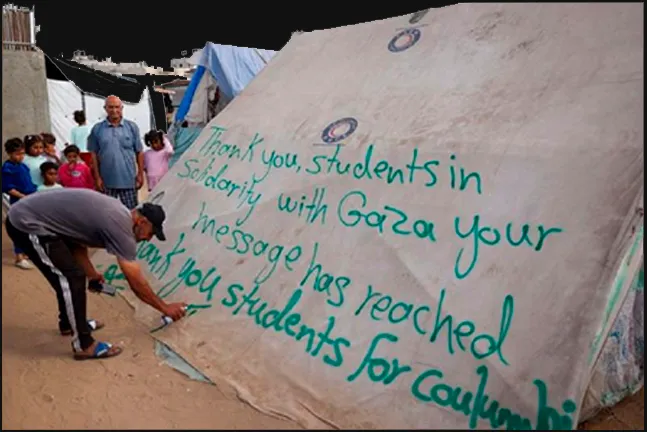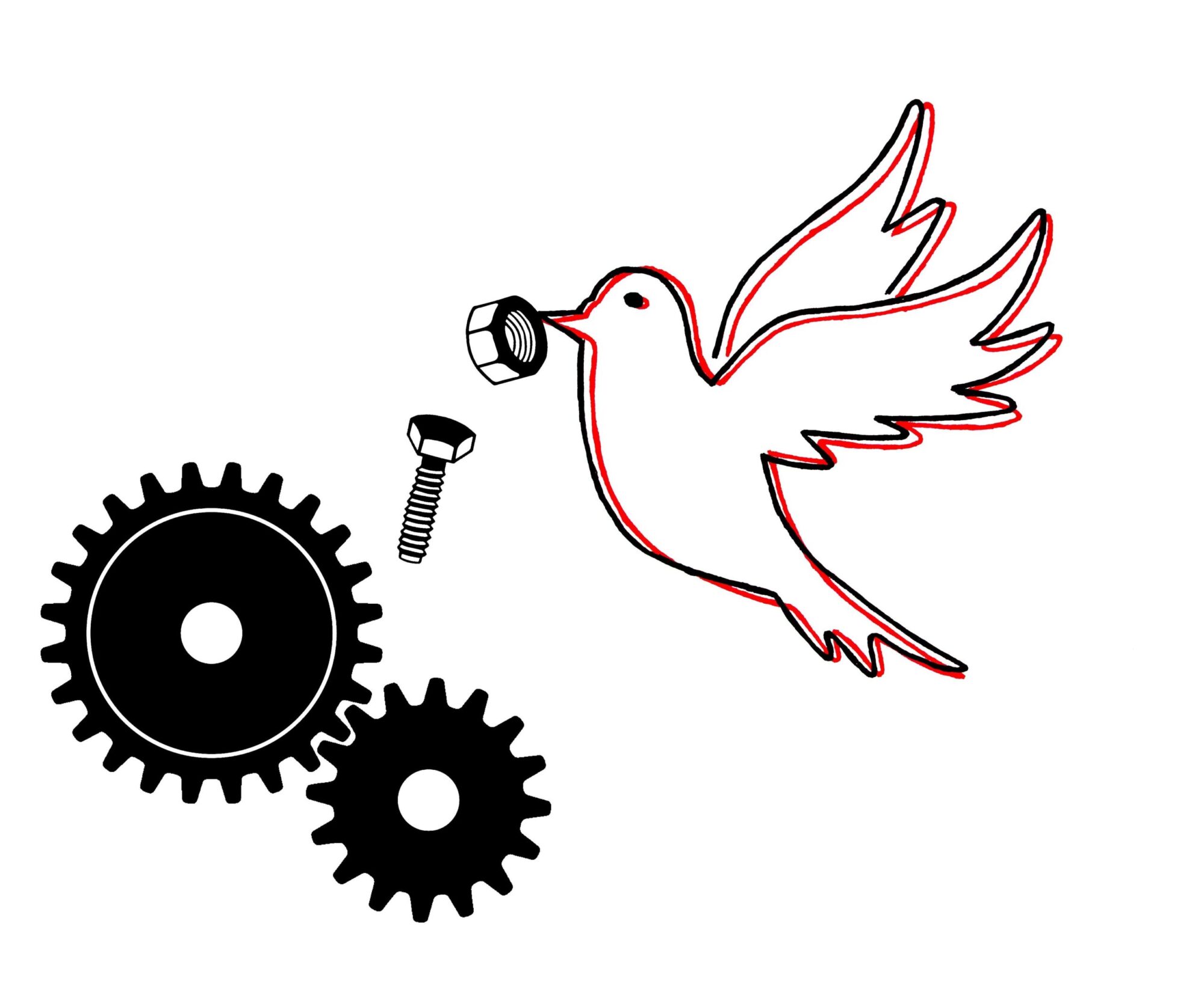We publish a new article from our friends from Internationalist Perspective who accepted the invitation to the Action Week.

The student protests are a mixed signal. On the one hand, it is heartening that students in more than 160 colleges and universities in the US are protesting the war in Gaza, and do so with passion and courage. They have inspired many others in other countries and continents to join the fight against this outrageous mass murder. As the New York Times wrote recently, they think not only about Gaza.
For many of them, it’s also about racism, police brutality, climate change and other issues that are all symptoms of the current stage of capitalism’s decadence. They are beginning to connect the dots. They are a reflection of a broader mood of resistance that is brewing. Which is a good sign. We empathize with their resistance against the repression unleashed against them. Students have been ‘doxxed’, harassed, intimidated, surveiled, reviled, suspended, expelled, evicted, arrested, teargassed and beaten but this has not stopped them. Of course, the democratic state does not mind them protesting, as long as they do so politely, without creating any disturbance to the social order which causes these wars and which the legal system is designed to protect. But when they dare to go beyond innocuous protest, the violence of the sanctimonious democratic state rains down on them, applauded by both Democrats and Republicans. Even Alexandria Ocasio-Cortez, the leader of the left wing in Congress, warned the students against ‘outside agitators’. Students in Atlanta replied “as clearly as possible, we welcome ‘outside agitators’ to our struggle”. And students of Cal Polytech stated, “the distinction between student and non-student only enforces the gates between the university and its surrounding communities. By rejecting this difference we break open the gates.” So far, so good.
But on the other hand, it’s not a good sign that the protests are being encapsulated by nationalism. Maybe that’s not surprising. The culture we’ve been fed makes us see the wars of capitalism as battles between good and evil. Between bullies and underdogs, between righteous nations and malevolent regimes. So you have to pick a side. Because if you don’t, you support the evil side. Bishop Tutu said so. So, given the mass killing of Gazan civilians by the IDF, for many the choice is easy: support Palestine, wave the Palestinian flag, shout “Palestine shall be free, from the river to the sea”1, silence any critique of the crimes committed by “our side”, Hamas etc, which is as much as the IDF committed to continue the carnage, in the name of anti-colonial liberation.

They are missing what is really happening. The wars that we see multiplying are not anti-colonial, are not about democracy versus authoritarianism, they are about the capitalist social order plunging in a condition in which competition increasingly is taking on military forms. Some headlines of last week alone tell the story. Two were about the desperate measures of the Ukrainian state and the Russian state to find more cannon fodder, having consumed already hundreds of thousands of lives. Another revealed that global armament spending has reached a 35 year high in 2023, 6.8% higher than in 2022. A fourth one mentioned the rise of protectionist measures (more than 2,500 were introduced last year) and the bending of trade towards the formation of antagonistic blocs. A fifth one reported that India’s prime minister Modi, in an election speech, called Muslims “infiltrators” who want to steal India’s wealth. And we haven’t even mentioned the headlines on the carnage and the murder by starvation in Gaza yet.
All this shows what’s going on: war, once again, is capitalism’s answer to its impasse. But to wage war, the capitalist rulers need the support or submission of the ruled. They need the working class to produce the tools for war, they need its youth to fight and die in the war. That’s why nationalism is the most important weapon the ruling class possesses. Nationalism implies inclusion and exclusion. It means acceptance that all those who “belong” to a nation (rulers and ruled, exploiters and exploited) have common interests, from which the others, who don’t “belong” to that nation are excluded. And the more a category of “others” can be scapegoated, portrayed as “infiltrants” polluting the nation, to use Modi’s words, and the more the inter-imperialist competition can be painted as a battle between good and evil, the more nationalism primes the population for war. Ultimately, for the benefit of ideological war preparation, it matters less which national flag you’re carrying, as long as you carry one.
At the start of the Iraq war, IP distributed a leaflet, entitled “Don’t talk about resisting the war, unless you’re prepared to resist capitalism”. That is still true today. And looking at the demands of the student protests, they’re not. Some don’t want the war to stop (or only for a while), they want ‘their’ side to continue it until ‘victory’ (new borders) is achieved, “by any means necessary”. Others genuinely want to resist the war, but not to resist capitalism. The main demand, arising in campus after campus, is divestment of their institutions from business in Israel in general, and from companies that do business with the Israeli military.
First, this is futile. Capital is invested where it can obtain a profit. If universities, which are capitalist enterprises themselves with massive investment funds, are forced to divest from profitable companies, other investors will gladly take their place. Nothing will change, except that the students can congratulate themselves on their ‘victory’ and their clean conscience.
Secondly, the demand is itself a form of propaganda for capitalism: it supposes the possibility of capitalist entities behaving “ethically”, working for the common good, starving the military industrial complex, greening the earth. In short, it is framed in atavistic reformism, in the illusion that the capitalist system can be saved from itself, that there is no need to destroy it.
If the students really want to resist the war, they have to drop their nationalist flags and slogans, their support for one warring side against another, leave their campuses and spread the knowledge that capitalism is waging a war against humanity, and that the working class all over the world will be its victim, unless it wakes up and refuses to tolerate this madness.
INTERNATIONALIST PERSPECTIVE
5/10/2024
——————————————————————-
1This slogan has been portrayed as ‘anti-Semitic’, as implicitly saying that all Jews must be expelled from the region. While it’s true that it had this meaning in past PLO and Hamas declarations (and, in the opposite sense, in Zionist declarations which used the formulation “from the river to the sea” the first) , for most current activists it expresses their support for the so-called one state-solution. The slogan implicitly recognizes that this is a war about changing borders.
SOURCE: THE STUDENT PROTESTS: A MIXED SIGNAL – Internationalist Perspective
